Cervical Cancer Awareness Month
Start your year with purpose by turning your attention to the Global Strategy for cervical cancer elimination. Throughout the Month of January, we observe Cervical Cancer Awareness Month (CCAM) as a time to raise awareness of the problem, highlight our offerings contributing to the solution, and magnify our support of the World Health Organization (WHO) global strategy to eliminate cervical cancer as a public health problem.
The Problem
Cervical cancer is preventable, yet in 2020, an estimated 604,000 women were diagnosed with cervical cancer worldwide and about 342,000 women died from the disease.
The Solution
The World Health Organization’s global strategy to eliminate cervical cancer as a public health problem includes a roadmap that all countries must reach and maintain an incidence rate of fewer than 4 new cases of cervical cancer per 100,000 women per year. Achieving that goal rests on three key pillars and their corresponding targets:
- Vaccination: 90% of girls fully vaccinated with the HPV vaccine by the age of 15 years (its recommended that boys be vaccinated as well)
- Screening: 70% of women screened using a high-performance test by the age of 35 years, and again by the age of 45 years
- Treatment: 90% of women with precancer treated and 90% of women with invasive cancer managed
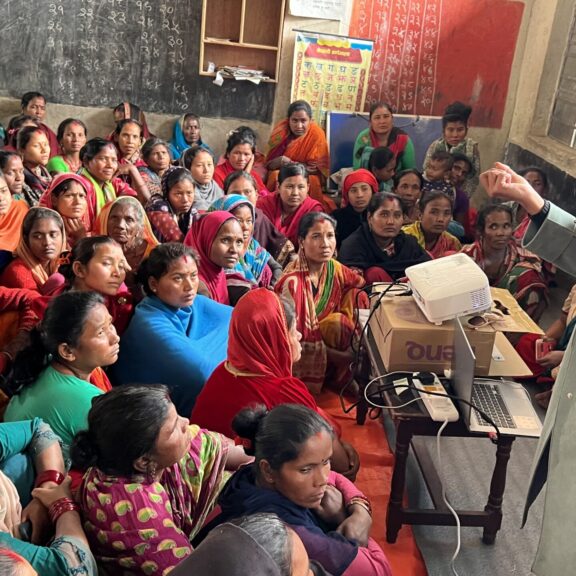
Our Work
Our Work
IGCS supports the WHO Cervical Cancer Elimination Initiative to reduce the incidence of and mortality from cervical cancer by:
- Providing mentorship and training to healthcare professionals who care for women with preinvasive disease and cervical cancer.
- Providing professional education for those who manage patients with cervical cancer found in the Education360 Learning Portal.
- Convening cancer care professionals to share research and collaborate at the IGCS Annual Global Meeting.
- Patient advocacy programming, networking, and awareness campaigns
Social Media Toolkit
Tell Us About Your Campaign
If you’d like to spread awareness and show your support for the global strategy to eliminate cervical cancer, you can utilize and share our social media toolkit with images and facts driving awareness about cervical cancer and dispelling common myths about HPV and the vaccine. New this year, we’ve made the image templates available in the free online design software, Canva for you to customize and download. You can add your logo and translate the information to your preferred language.
Will you inform us of your plans? If you use the IGCS-IGCAN social media toolkit or if you need assistance, please email Debbie.leopold@igcs.org. One of our goals for the year is to measure the impact of our efforts — we’d love to hear about your campaign and learn how valuable our resources are to you and the reach you have with the materials. And if you translate the information, we’d appreciate you sharing your translations with us so we can add them to our toolkit!
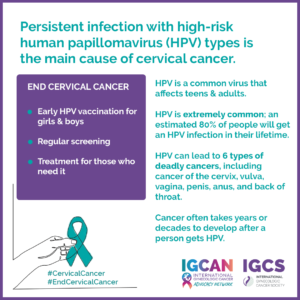
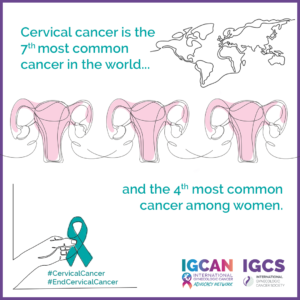
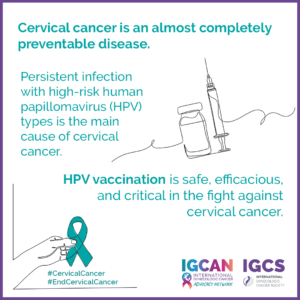
Free Education Throughout January
Free Education
This year, the following educational courses, hosted on IGCS Education360 Learning Portal, customarily only free to IGCS Member are available to everyone interested in learning about gynecologic cancers to anyone with an IGCS account. If you are receiving this email, you already have an account with us!
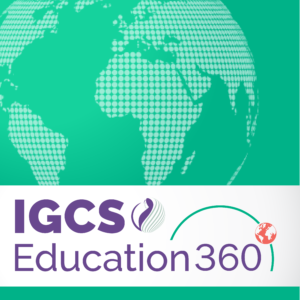 Radiation Oncology Virtual Tumor Board - Carcinoma Cervix with Nodal Metastasis - Management Challenges
Radiation Oncology Virtual Tumor Board - Carcinoma Cervix with Nodal Metastasis - Management Challenges
Radiation oncologist experts provide advice for patient case presented by Dr. Vinita Thampy of India. Utilizing the Project ECHO® Virtual Tumor Board format, the recording includes a case presentation, distillation, panel discussion, and Q&A.
Palliative Care – Better Outcomes for Everyone
IGCS Palliative Care Workgroup Members discuss the IGCS Declaration on Palliative and Supportive Care, the need for more equitable access to palliative medicine and care and provide valuable information about how clinicians in LMICs can begin to develop palliative care programs and teams.
 2023 Presidential Plenary: Relieving Serious Health Related Suffering for Women with Gynecological Cancer
2023 Presidential Plenary: Relieving Serious Health Related Suffering for Women with Gynecological Cancer
IGCS President, Keiichi Fujiwara, and a panel of international physicians championing palliative care discuss the IGCS Declaration on Palliative and Supportive Care. Dr. Stephen Connor gives the Keynote speech.
Surgery for Early Cervical Cancer: Current Key Aspects
Master Session: IGCS 2023 Annual Global Meeting
Non-Surgical Management of Cervical Cancer: Locally Advanced and Recurrent Metastatic
Master Session: IGCS 2023 Annual Global Meeting
Relevant Publications from IJGC
To aid in promoting and raising awareness of cervical cancers, the International Journal of Gynecological Cancer is pleased to offer free access to a selection of twenty research articles and reviews from the past year. Access the articles here.
A Patient's Perspective
In this special presentation, cervical cancer survivor Hallie Saunders discusses her diagnoses with Dr. Wendel Naumann, the gynecologic oncologist who managed her treatment. Dr. Naumann is the co-chair of the IGCS Education360 Advances and Updates Work group on our Education Committee and the Associate Medical Director of Clinical Trials at the Levine Cancer Institute, Atrium Health in North Carolina, USA.
Hallie agreed to share her story and wants women to know how important it is to pay attention to your health and to get vaccinated against HPV.

Supported in part by Seagen | Genmab
Millicent's Lived Experience with Cervical Cancer in Kenya
Millicent Kagonga describes her difficult journey with cervical cancer in Kenya. Recounting her experience with shame, fear, hopelessness, and the stigmas associated with cancer she tells us how she overcame seemingly impossible challenges and became a symbol of hope for others struggling with a cancer diagnosis in her community.
Cervical Cancer Patient Interview: SAMRC/UCT Cape Town
In this video, Dr Nomonde Mbatani, Head of Gynaecology Oncology at Groote Schuur Hospital interviews a cervical cancer patient in the Radiation Oncology Clinic South African Medical Research Council/University of Cape Town (SAMRC/UCT) Gynaecological Cancer Research Centre.
Informative Talks
Innovative Technologies for Cervical Cancer Prevention and Treatment
Kathleen Schmeler, MD
Dr. Schmeler discusses best practices for cervical cancer screening and treatment, including options for and solutions in middle- and low-resource settings.
ConCerv: A prospective trial of conservative surgery for low-risk, early-stage cervical cancer
Kathleen Schmeler, MD
Dr. Schmeler presents the findings of the ConCerv Clinical Trial, a study conducted from 2010-2019 to prospectively evaluate the feasibility of conservative surgery in women with early-stage, low-risk cervical cancer.
IGCS Cervical Cancer WhatsApp Group
We can all play a part in spreading education and awareness in service of these goals and every bit of knowledge spread can make a difference. Not only do communities and the public benefit from awareness and the destigmatization of HPV and cervix cancer, but those who influence policy and those working within health care systems must be equipped with this knowledge and resources as well.
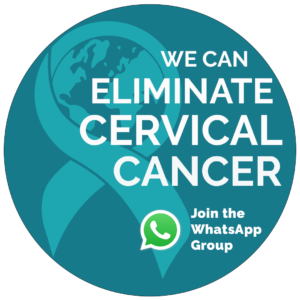 Last year, IGCS and IGCAN invited clinicians, researchers, survivors, and advocates to join an informal, semi-private online community hosted on What’s App. Nearly 80 individuals from all regions of the world have been participating in this group for the past 12 months, sharing information about their local efforts and progress being made to improve vaccination, screening, and treatment.
Last year, IGCS and IGCAN invited clinicians, researchers, survivors, and advocates to join an informal, semi-private online community hosted on What’s App. Nearly 80 individuals from all regions of the world have been participating in this group for the past 12 months, sharing information about their local efforts and progress being made to improve vaccination, screening, and treatment.
Join the WhatsApp group so you too can stay updated on what’s happening in this space, and feel free to ask questions. IGCS Board Member, Dr. Heleen van Beekhuizen of the Netherlands and members of the IGCS Advocacy Committee moderate this community.


